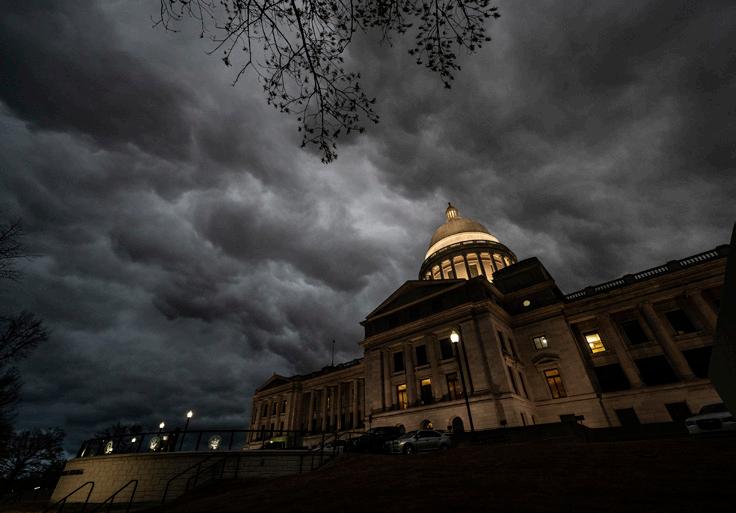
3 minute read
House committee hears four hours of testimony on Freedom of Information bills; rejects one and approves the other
Continued from Page 1
1967. The committee eventually voted to reject the bill in a 9-4 vote.
Advertisement
Yet, after a nearly 45-minute presentation of his bill, Ray and Arkansas Deputy General Counsel for Opinions Ryan Owsley told the committee that HB 1726 had broad support from all state government and law enforcement officials statewide.
"Before I walk through the mechanics of the bill, I just want to state that this bill has broad support. It is supported by Gov. Sarah Huckabee Sanders, Attorney General Tim Griffin, Secretary of State John Thurston, and law enforcement are united in support of this bill, including State Police, the Sheriff's Association and the Chiefs of Police," Ray said.
Ray then drilled down into each key provision of the six-page bill filed on Monday, March 27, and set for a special order of business in the House committee. In making his pitch, Ray told the panel that parts of the FOIA needed to be updated, and it was challenging to debate opponents on the merits of the 55-yearold law.
"You know, there are some things in our politics where it is sometimes difficult to have an honest conversation about. Social Security comes to mind; insolvent pension systems is another, and then there is FOIA," Ray testified. "And in almost every discussion of FOIA, the debate is painted as a binary choice."
In closing, Ray told the House committee that he skipped a meeting with the legislature-appointed FOIA Task Force due to a scheduling conflict with another bill he had to present in the Senate. The task force held a virtual emergency meeting on Tuesday, March 28, where they unanimously backed recommendations to reject both FOIA proposals before the House committee. They also supported sending an additional "strong message" to the legislature that HB 1726 was not in the "best interest of the people of Arkansas."
Among many things, HB 1726 would exempt "undisclosed or ongoing investigations by law enforcement agencies of suspected criminal activity and any evidence or materials likely to be used by law enforcement in a criminal prosecution."
It would also amend the FOIA statute regarding exempt communications between a public official and government legal counsel and records related "to a needed determination of policy or action." Records exempt from public purview under HB 1726 include legal drafts, notes, recommendations, memorandums and correspondence, among other documents.
Following Steinbuch's broadside, APA past presidents Ellen Kreth and Rusty Turner offered strong testimony against Ray's bill. Kreth, owner and publisher of the Madison County Record, provided real-world examples of how the state's FOIA has helped the press uncover and investigate cases of sexual misconduct, fraud and corruption.
"In this (legislative) session, a lot of the bills have been about helping children," Kreth told the committee. "This bill harms them and would gut FOIA …."
Turner, the editor of the Northwest Arkansas Democrat-Gazette, called HB 1726 a "misguided bill" that would diminish the public's access to the workings of local and state government.
The bill also would allow the government to charge FOIA requesters if the time it takes to retrieve, review and redact the records exceeds eight hours. The press and other FOIA askers may also be charged at a rate that is, at most, the salary or hourly pay of the lowest-paid employee or contractor with the necessary skill and training to respond to the request.
Further, if approved, HB 1726 would extend the government's response time for FOI materials to more than triple, from three working days to 10 days. Following Ray's pitch for his bill, a parade of open government and transparency supporters made the strong case that the legislature would "undermine," "gut," "disembowel," and “destroy” one of strongest state FOIA laws in the nation.
In one of the more colorful testimonies before the House committee, University of Arkansas at Little Rock law professor Robert Steinbuch testified that the FOIA Task issued a strongly worded statement against HB 1726 for the first time in its fiveyear history.
"They have never issued an opinion like that before. That's how bad this bill is," said Steinbuch, a task force member and author of the definitive treatise on the state's FOIA law.
"The purpose of the FOIA, as you have heard, is to expose the government's deliberative process to the members of the taxpaying public so they can evaluate government performance and the performance of the people elected or appointed to do government business," he said. "But this bill would make it easier for the government to operate outside the public's view."
Toward the end of the three-hour hearing on HB 1726, Secretary of Public Safety and Director of Arkansas State Police Mike Hagar told the committee that while he supported open government, current law allowed internet vendors to profit from police chases and pursuit videos that rack up millions of views on social media platforms.
"As a result, we've had to assign two full-time employees, one attorney and two staff, to support the financial gain of these vendors," said Hagar. "One vendor currently has 4.4 million subscribers while generating untold financial gain."
Sonny Albarado, editor-in-chief for the Arkansas Advocate and a state FOIA Coalition member, ended the marathon hearing by telling the committee that those supporting HB 1726 represented varied government interests, not private citizens.
"I think the voice of the citizens should be heard," said Albarado. The veteran journalist and FOIA advocate then asked






